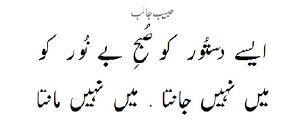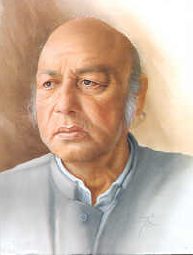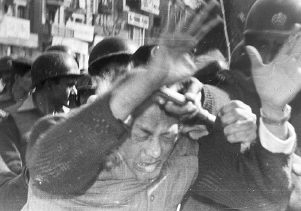Adil Najam
 For much of Pakistan’s history, Habib Jalib was a voice of rebellion. Often an angry voice, but always an honest voice. He wrote in the idiom of the people and the jalsa was as much a platform for his poetry as was the mushaira. He often wrote in the idiom of anger. But that idiom was a function of his subject matter – Pakistan’s beleagured politics.
For much of Pakistan’s history, Habib Jalib was a voice of rebellion. Often an angry voice, but always an honest voice. He wrote in the idiom of the people and the jalsa was as much a platform for his poetry as was the mushaira. He often wrote in the idiom of anger. But that idiom was a function of his subject matter – Pakistan’s beleagured politics.
 Jalib was a poet at heart but a political worker at heart. He was not only prepared to say what he believed to be right, but was willing to be beaten up for it (see picture below). He became a national figure with his poem Dastoor which was about Ayub Khan’s tailor-made ‘constitution’ and later with his support for Fatima Jinnah’s campaign against Ayub Khan:
Jalib was a poet at heart but a political worker at heart. He was not only prepared to say what he believed to be right, but was willing to be beaten up for it (see picture below). He became a national figure with his poem Dastoor which was about Ayub Khan’s tailor-made ‘constitution’ and later with his support for Fatima Jinnah’s campaign against Ayub Khan:
Aisay dastoor ko
Subh-e-baynoor ko
Mein naheen manta
Mein naheen janta
During the Zia-ul-Haq era, his verses again became a popular anthem for those who opposed dictatorship:
Sar sar ko saba, zulmat ko Zia
banday ko khuda, kya likhnaa
 He died in 1993, but one has no doubt that if alive he would be on the streets protesting today. He was jailed by Ayub Khan, by Zulfiqar Ali Bhutto, by Zia ul Haq, and although he was released during the first Benazir Bhutto government, he was no less honest in his assessment of her performance:
He died in 1993, but one has no doubt that if alive he would be on the streets protesting today. He was jailed by Ayub Khan, by Zulfiqar Ali Bhutto, by Zia ul Haq, and although he was released during the first Benazir Bhutto government, he was no less honest in his assessment of her performance:
Haal ab tak wahi hain ghareeboan kay
Din phiray hain faqat waziroan kay
maqrooz hai daise ka her Bilawal
paoon nangay hain Benazeeroan kay
We have featured the political poetry of Faraz and Faiz here in prior installments of ATP Mushaira, I wondered what Habib Jalib might have to say about what is happening in Pakistan today. I did not have to wonder long, this long-time champion had both foretold and fore-commented on these long before they actually happened.
His call to protest, even in the face of brutality and beatings, is best summarized in his famous movie song (sung by Mehdi Hassan to Rashid Atray’s music from the film Zarqa):
More poignant is this recording form a Mushaira, Jalib bazaban-i-Jalib:
ba-har-aalam Khuda ka shukr keeji-aye, unn ka kehna haiN
khatta kartaiN haiN hum jo shikwa-i-taqdeer kartaiN haiNhumarey dard ka Jilib madaawa hou nahiN sakta
keh harr qatil ko chaara-garr say hum taabir kartay haiN
FInally, here a recording that includes an interview with him and some of his most poignant works. Including the all-time great poem Dastoor (Mein nahin Manta).
Phool shakhooun pay khilnay lagay, tum kaho
Jaam rindoun ko milnay lagay, tum kaho
Chaak seenoun kay silnay lagay, tum kaho
Iss khulay jhoot ko, zehn ki loot ko
Mein nahin jaanta, mein nahin maanta
Also of note is the Likhna verses for current relevance:
Virsay mein humain, yeh gham hai milla
iss gham ko naya, kiya likhna



















































Another poem of Habib Jalib that echoed the sentiments of people at that time went something like this (it was when the prices of wheat flour and other essential commodities had increased):
Saath (60) ropay man hai atta
Aur us par bhi hai sannaatta
Adam, Gohar aur Dawood
Banay haiN Birla aur Tata
Sadar A’yub zindabad
1. He spelled Ayub with the Urdu letter A’in and not Alif, which is a plural of A’ib meaning bad, defect or sin.
2. Gohar in these lines is Ayub’s son who was believed to have amassed wealth and had joined the club of Pakistani industrialists Adamjis and Dawoods
Please note that the last video has been changed. The new video includes an insightful interview with Jalib and a selection of some of his most famous poems, including Dastoor (written during the Ayub Khan regime).
Renal failure of Munir A. Malik
http://free-pakistan.blogspot.com/2007/11/torture- by-military-agencies-lead-to.html
For mushi
Ek Sakhs ke hootoon mudhat say ruswah hay watan duniya bar may
Hay deedahwaroon is zilat ko kismet kah likha kiyah likhna
The second video, its nawab bugit hugging jalib. I di’t know Nawab Sahib used to attend mushira’s.
Waited long to see something about Jalib on this site…..it was always faiz and ghalib here. Jalib represents a true activits, a pakistani poet, people’s poet. Nodoubt even Faiz called him awami-shahir of that generation. Jalib will never be forgetten.
Aur Sab Bool Gay Haraf-e-Sadaqat Likhna
Ray Gayeh Kaam Humarah he Bagawat Likhna